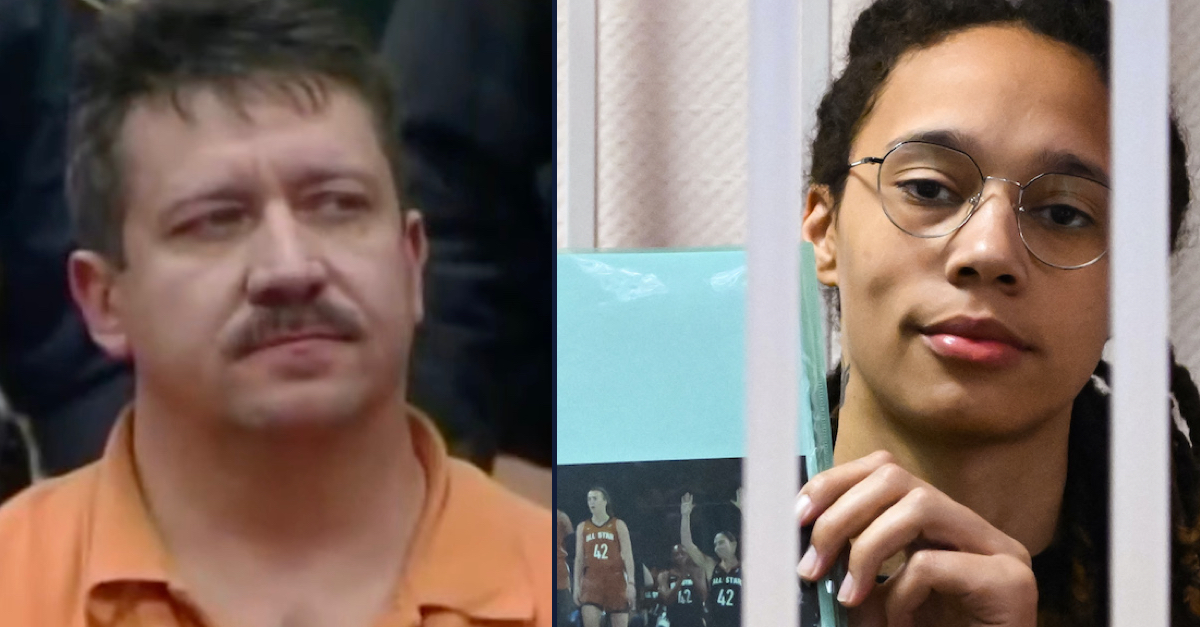
Left: Russian arms dealer Viktor Bout, seen after being apprehended in Bangkok, Thailand, in March 2008 (via YouTube screengrab). Right: US WNBA basketball superstar Brittney Griner sits inside a defendants’ cage with a picture depicting her WNBA fellow players wearing jerseys with her number, 42, during the leagues All-Star Game, during a hearing at the Khimki Court in the town of Khimki outside Moscow on July 15, 2022. (Photo by NATALIA KOLESNIKOVA/AFP via Getty Images)
Listen to the full episode on Apple, Spotify or wherever else you get your podcasts, and subscribe.
Last week, the United States released Russian arms trafficker Viktor Bout from prison in order to free WBNA star Brittney Griner. Now, Bout’s lawyer has confirmed reports that former President Donald Trump rejected a proposed prisoner swap that would have released former U.S. Marine Paul Whelan, who is still languishing in a Russian prison.
“Some years ago, the Trump administration turned that down. They didn’t even consider it,” attorney Steve Zissou said on the latest episode of Law&Crime’s podcast Objections: with Adam Klasfeld. “Actually, they didn’t even make much of a deal about it, and they really did lose an opportunity to get Whelan home.”
As time passed from one administration to another, Zissou added: “The Biden administration lost a lot of leverage in negotiations because Viktor had gotten that much closer to completing his sentence, and so he became less valuable, if you will.”
By the time Griner was freed, Bout had served more than 14 years of his 25-year sentence. Expecting Bout to have received credits in the federal criticism for a roughly four-year break, Zissou estimated that his client already had served roughly two-thirds of his term. The swap still inspired stinging rebukes, particularly from the political right.
“We don’t negotiate with terrorists,” tweeted Donald Trump Jr., in response to the trade. “Unless of course we trade an actual terrorist for a woke activist to a brutal and often terroristic regime… in that case we do negotiate with terrorists.”
Zissou countered that the Trump scion had selective memory about releasing dangerous people.
“The reality is, when the Trump administration surrendered Afghanistan, they released 5,000 Taliban terrorists into the wild, and they’re creating way more havoc than Viktor Bout ever did,” Zissou said. “So, it’s unfortunate that they continue to be so hypocritical and lying basically, as they do routinely, but it’s still unfortunate that as a result of their inaction, Paul Whelan is still in jail.”
In 2008, Bout was arrested in Thailand after meeting with Drug Enforcement Agency informants posing as Colombian guerrillas from the FARC, which the United States then considered to be a terrorist organization. The informants claimed to be seeking to buy a vast arsenal of weapons: 800 surface-to-air missiles (SAMs), 30,000 AK-47 firearms, 10 million rounds of ammunition, five tons of C-4 plastic explosives, “ultralight” airplanes outfitted with grenade launchers and unmanned aerial vehicles, according to the Department of Justice.
In a meeting, the agents caught Bout on tape saying: “We have the same enemy,” referring to the United States.
That was enough to give U.S. courts jurisdiction on weapons of mass destruction charges, which carried a 25-year minimum sentence. A Manhattan federal court jury found Bout guilty on all charges, and the presiding judge gave him the most lenient sentence available, expressing qualms about the sting operation that led to Bout’s downfall. The case generated massive controversy in Russia, where Bout has reported links to the security services.
The U.S. Attorney’s office says that the case took a dangerous arms dealer off the international chess board, but Bout’s lawyer claims it started a tit-for-tat escalation with Russia.
“That targeting is the thing that has led directly to US citizens being safe, unsafe around the world,” Zissou said. “In other words, and what Russia said is, ‘Okay, you’re going to do that to one of our citizens, but we don’t have laws that allow us to target your citizens in your country. But if they come here, you can be certain if they got involved in criminal acts, they are going to be treated to the harshest extent possible because that’s what you do our citizens.”
The arrest and harsh prosecution of U.S. citizens by Russia for use as bargaining chips has often been described by some experts as “hostage diplomacy.”
On the podcast, Zissou provides an inside account of the momentum that led up to the trade. Bout’s former sentencing judge, Shira Scheindlin, publicly backed the Griner swap. Families of U.S. soldiers captive in Russia had demurred from contacting Bout’s legal team, but according to Zissou, they eventually established contact with the family of Trevor Reed, who was later released from Russia. He, too, openly supported releasing Bout for U.S. prisoners in Russia.
Perhaps one of the most surprising shows of support came from investigative journalist Douglas Farah, the author of the book Merchant of Death that gave Bout the nickname that trailed him ever since. In Politico, Farah argued that the world has changed since Bout first got behind bars, and he no longer has the networks and connections to allegedly provide the arms that fueled dictators, warlords, and child soldiers.
Though Farah has been a thorn in his client’s side, Zissou agrees that Bout has no future in arms sales.
“Bottom line is, you don’t hear about these individual arms dealers anymore that are controlling these vast weapons caches,” Zissou noted. “Countries control this now. You know, every arm that is built has a serial number, a tracking device. They can follow it where it goes all over the world. You can’t just put them on planes and ships anymore and expect them not to be intercepted. The U.S. satellites, the Russian satellites, they keep track of all this stuff.”
Listen to the full episode below: